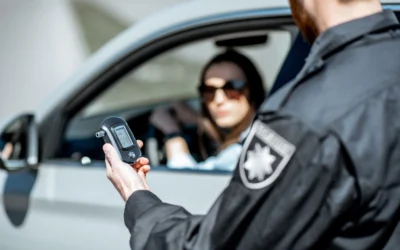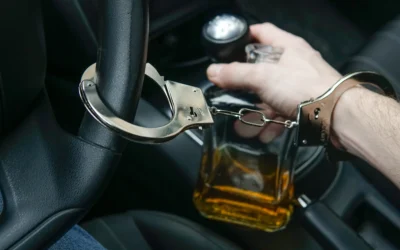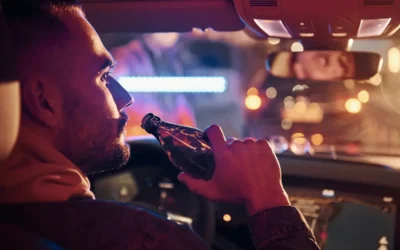What You Need to Know Before Your Court Date
That sick feeling in your stomach when you see those flashing lights behind you – everyone knows it. Maybe you just finished dinner and had a glass of wine, or you were driving home after your friend’s birthday party. Whatever the case, now you’re staring down your first DUI charge in Nevada, and your head’s spinning with a million questions about what’s coming next.
Here’s the thing about getting a DUI in Nevada for the first time – it’s way more serious than most folks think it’ll be. Nevada doesn’t mess around when it comes to drunk driving laws. They’re among the toughest in the whole country, and that means even if this is your very first time getting caught, you’re looking at some real consequences that could mess with your life for months, maybe even years. We’re talking about actual jail time, losing your license, and paying out serious money – this isn’t just some traffic ticket you can pay and forget about.
But here’s some hope in all this mess: knowing what you’re dealing with and getting the right legal help can completely change how things turn out for you. We’re going to break down everything you need to understand about first-time DUI charges in Nevada, starting from the moment those handcuffs clicked until you walk out of that courthouse for the last time.
What Makes It a DUI in Nevada?
Nevada law defines driving under the influence more broadly than many people realize. Under Nevada Revised Statute 484C.110, you can be charged with DUI if you operate a vehicle while:
- Having a blood alcohol concentration (BAC) of 0.08% or higher
- Being under the influence of alcohol to a degree that renders you incapable of safely driving
- Being under the influence of a controlled substance
- Having any amount of certain prohibited substances in your blood or urine
The 0.08% Rule Isn’t Everything
Many people mistakenly believe that staying under 0.08% BAC guarantees they won’t face DUI charges. This isn’t true in Nevada. If alcohol or drugs impair your ability to drive safely, you can be arrested and convicted regardless of your BAC level. Officers look for signs like slurred speech, bloodshot eyes, poor coordination, and erratic driving patterns.
Drug-Related DUI
Nevada treats drug-impaired driving just as seriously as alcohol-impaired driving. This includes prescription medications, over-the-counter drugs, and illegal substances. Even if you have a valid prescription, you can still face DUI charges if the medication impairs your driving ability.
What Happens Immediately After Your DUI Arrest?
The moments following a DUI arrest set several legal processes in motion simultaneously. Here’s what typically occurs:
The Arrest Process
Once arrested, you’ll be taken to the police station or jail for booking. During this time, you’ll likely be asked to submit to a chemical test (breath, blood, or urine) to determine your BAC or the presence of drugs. Nevada’s implied consent law means that by driving on Nevada roads, you’ve already consented to these tests.
License Seizure
The arresting officer will immediately confiscate your driver’s license and issue you a temporary driving permit that’s valid for seven days. This happens regardless of whether you’re ultimately convicted of DUI – it’s an administrative action that occurs automatically upon arrest.
Two Separate Proceedings
Your DUI case involves two distinct legal processes:
- Administrative Hearing (DMV): This focuses solely on your driving privileges
- Criminal Court Case: This addresses the criminal charges and potential penalties
These proceedings operate independently, meaning you could potentially lose your license through the DMV process even if you’re not convicted in criminal court, or vice versa.
Criminal Penalties for First-Time DUI in Nevada
Nevada takes a tough stance on DUI offenses, and even first-time offenders face serious consequences. According to NRS 484C.400, the penalties for a first DUI conviction include:
Jail Time
- Minimum: 2 days in jail
- Maximum: 6 months (180 days) in jail
- Alternative: The minimum jail time can often be satisfied through 48 to 96 hours of community service instead of actual jail time
Most judges will credit the time you spent in custody during your arrest toward this requirement. If you spent two days in jail following your arrest, you may have already satisfied the minimum jail requirement.
Fines and Court Costs
- Fine range: $400 to $1,000
- Court costs: Additional fees that typically add $200-400 to your total financial obligation
- Total typical cost: Most first-time offenders pay between $600-800 when combining fines and court costs
Probation
Courts may impose probation as part of your sentence, typically lasting 12 months. Probation conditions often include:
- Regular check-ins with a probation officer
- Prohibition on consuming alcohol or drugs
- Requirement to maintain employment or attend school
- Community service obligations
- Compliance with all court orders
License Suspension and Your Driving Privileges
Losing your driving privileges represents one of the most disruptive consequences of a first-time DUI. Nevada law creates multiple pathways for license suspension, each with different timelines and requirements.
Administrative License Suspension
Under NRS 484C.210, your license faces automatic suspension through the DMV if you:
- Refuse to take a chemical test: 90-day suspension
- Take the test and register 0.08% BAC or higher: 90-day suspension
The Seven-Day Rule
You have exactly seven days from your arrest date to request a DMV hearing to contest the administrative suspension. Miss this deadline, and your suspension becomes automatic. The hearing provides your only opportunity to challenge the administrative suspension before it takes effect.
Criminal Conviction Suspension
If convicted of DUI in criminal court, you face an additional license suspension of up to 185 days (approximately six months). This suspension runs separately from any administrative suspension you may have already served.
Getting Your License Back with an Ignition Interlock Device
Nevada requires most first-time DUI offenders to install an ignition interlock device (IID) in their vehicle as a condition of license reinstatement. This device requires you to provide a breath sample before starting your car and periodically while driving.
IID Requirements for First-Time Offenders:
- Installation period: 185 days minimum
- Cost: Approximately $100-150 per month (you pay all costs)
- Maintenance: Monthly calibration and data downloads required
- Violations: Additional penalties for tampering or circumvention attempts
Alternative Options
In limited circumstances, you may qualify for a restricted license instead of an IID. This typically requires demonstrating that installing an IID would cause undue hardship, such as not owning a vehicle or having a medical condition that prevents you from providing adequate breath samples.
Mandatory Requirements You Cannot Avoid
Beyond jail time and fines, Nevada law mandates several additional requirements for first-time DUI offenders that you cannot negotiate away:
DUI Education Course
All first-time offenders must complete an approved alcohol and drug education program. These courses typically:
- Last 8-16 hours depending on your BAC level
- Cost $100-300 (you pay all expenses)
- Must be completed within a court-specified timeframe
- Require attendance certificates to be filed with the court
Victim Impact Panel
You’ll be required to attend a victim impact panel where you’ll hear from individuals affected by impaired driving. This emotional experience aims to help offenders understand the real-world consequences of DUI beyond legal penalties.
Community Service Alternative
If the court allows community service instead of jail time, you’ll typically need to complete 48-96 hours of approved community service activities. Popular options include:
- Habitat for Humanity projects
- Local food bank assistance
- Park and recreation maintenance
- Non-profit organization support
When Penalties Get Worse Due to Aggravating Factors
Certain circumstances can significantly increase the penalties for a first-time DUI, transforming what might have been a relatively manageable situation into a much more serious legal problem.
High BAC Enhancement
If your BAC measured 0.18% or higher (more than double the legal limit), Nevada law treats this as an aggravating factor requiring:
- Mandatory alcohol evaluation and treatment if recommended
- Enhanced monitoring during probation
- Possible installation of an IID for the full 185-day period without early removal options
Child Passenger Enhancement
Having a child under 15 years old in your vehicle during a DUI significantly increases potential penalties. Courts typically impose:
- Maximum fine of $1,000 (instead of potentially lesser amounts)
- Enhanced community service requirements
- Mandatory parenting classes or counseling
- Potential child endangerment charges as separate offenses
Work Zone or School Zone Violations
While DUI laws in Nevada don’t have specific penalty enhancements for work or school zones, charges such as reckless driving or endangerment may be added depending on behavior or location.
The Long-Term Impact of Hidden Consequences
While immediate penalties like jail time and fines are obvious, a first-time DUI conviction creates lasting consequences that can affect your life for years:
Insurance Ramifications
Auto insurance companies typically classify DUI offenders as high-risk drivers, resulting in:
- Premium increases of 50-200% or more
- Requirement for SR-22 insurance certification
- Some insurers may refuse to renew your policy entirely
- Higher rates typically persist for 3-5 years after conviction
Employment Considerations
Many employers conduct background checks that will reveal your DUI conviction. This particularly affects:
- Positions requiring driving (delivery, sales, transportation)
- Jobs requiring professional licenses
- Government employment opportunities
- Positions involving public trust or safety
Professional License Implications
If you hold a professional license (medical, legal, real estate, etc.), a DUI conviction may trigger disciplinary action by your licensing board, potentially including:
- Temporary license suspension
- Mandatory rehabilitation programs
- Permanent notation on your professional record
- In severe cases, license revocation
Future DUI Consequences
A first-time DUI conviction establishes your record for any future offenses. A second DUI within seven years carries much harsher penalties, including:
- Minimum 10 days in jail (cannot be substituted with community service)
- Fines up to $1,000
- One-year license suspension
- Mandatory IID installation for 1-3 years
Potential Defenses That Could Strengthen Your Case
Every DUI case is unique, and several potential defenses might apply to your situation. An experienced DUI attorney will examine every aspect of your arrest and the evidence against you.
Challenging the Traffic Stop
Police officers must have reasonable suspicion to stop your vehicle. If the stop was unlawful, any evidence obtained afterward might be suppressed, potentially leading to case dismissal. Common challenges include:
- No observed traffic violations or erratic driving
- Stops based solely on leaving a bar or restaurant
- Pretextual stops without legitimate traffic safety concerns
Questioning Test Accuracy
Chemical tests aren’t infallible. Potential issues include:
- Breathalyzer problems: Calibration errors, mouth alcohol contamination, medical conditions affecting results
- Blood test issues: Chain of custody problems, laboratory errors, improper storage
- Field sobriety test flaws: Medical conditions, poor testing conditions, officer training deficiencies
Medical and Physical Condition Defenses
Various medical conditions can mimic signs of intoxication or affect test results:
- Diabetes and hypoglycemia can create acetone breath that registers on breathalyzers
- Inner ear problems affect balance during field sobriety tests
- Certain medications can cause symptoms similar to alcohol impairment
- Fatigue, stress, or anxiety can impact test performance
Constitutional Violations
Your constitutional rights remain in effect throughout the DUI investigation process. Violations might include:
- Miranda rights violations during custodial interrogation
- Unreasonable search and seizure issues
- Right to counsel violations during testing procedures
Why Legal Representation Makes a Difference
While Nevada allows you to represent yourself in DUI proceedings, the complexity of DUI law and the severity of potential consequences make professional legal representation invaluable.
Court Procedure Complexity
DUI cases involve intricate procedural requirements with strict deadlines. Missing a filing deadline or failing to properly present evidence can devastate your case. Experienced DUI attorneys understand:
- Local court procedures and judge preferences
- Proper evidence presentation techniques
- Plea negotiation strategies
- Alternative sentencing options
Technical Evidence Challenges
Modern DUI cases often involve complex scientific evidence regarding breath and blood testing. Attorneys with DUI experience know how to:
- Challenge test procedures and equipment maintenance
- Identify chain of custody problems
- Present alternative explanations for test results
- Cross-examine technical witnesses effectively
Protecting Your Future
An experienced attorney looks beyond the immediate case to protect your long-term interests by:
- Negotiating for reduced charges when possible
- Exploring diversion programs or alternative sentencing
- Advising on collateral consequences like employment impact
- Ensuring you understand all requirements and deadlines
Plea Negotiation Advantages
While Nevada law restricts plea bargaining in DUI cases more than other offenses, opportunities sometimes exist for:
- Reduction to reckless driving in cases with weak evidence
- Alternative sentencing arrangements
- Structured payment plans for fines and costs
- Modified probation terms
Key Takeaways
Getting hit with your first DUI charge in Nevada? Yeah, it’s scary stuff. But knowing what you’re dealing with makes all the difference when you’re trying to figure out your next moves. Here’s what really matters:
Things You Need to Do Right Now:
- Call the DMV within seven days of getting arrested – this is huge for keeping your license
- Don’t post anything about this on Facebook, Instagram, or anywhere else online, and don’t talk to anyone about it except your lawyer
- Start collecting anything that might help your case – phone numbers of people who saw what happened, medical records, that kind of thing
- Think about work and how losing your license might mess with your job
The Hard Truth:
- Even though it’s your first time, you’re still looking at possible jail time
- Your license gets suspended two different ways – through the DMV and through court
- You’ll probably need one of those breathalyzer things in your car to get your license back
- When everything’s said and done, this whole thing usually costs more than five grand
What This Means Down the Road:
- This goes on your permanent record – it doesn’t just disappear
- Your car insurance is going to cost way more for years
- If you get another DUI within seven years, things get really bad really fast
- If you have a professional license for work, they might come after that too
There Might Be Ways to Fight This:
- A good lawyer can challenge lots of different parts of your case
- Those breath and blood tests aren’t perfect – sometimes they’re just wrong
- If the cops messed up your rights, that evidence might get thrown out
- Sometimes what looks like being drunk is actually something else entirely
Frequently Asked Questions
How long do I have to request a DMV hearing? You have exactly seven days from your arrest date to request a hearing with the Nevada DMV. This deadline is strict – missing it means your administrative license suspension becomes automatic. You can request the hearing online, by phone, or by mail, but don’t delay.
Can I get a work permit if my license is suspended? Nevada doesn’t issue traditional “hardship” or “work” permits. Instead, you may be eligible for a restricted license after serving a portion of your suspension period, typically requiring installation of an ignition interlock device. The availability and timing depend on the specific circumstances of your case.
Will I definitely go to jail for a first DUI? Nevada law requires a minimum of two days in jail for first-time DUI convictions. However, this can often be satisfied through community service (48-96 hours) instead of actual jail time. Many people also receive credit for time spent in custody during their arrest, potentially satisfying this requirement.
How much will my car insurance go up? Insurance increases vary by company and your driving history, but expect increases of 50-200% or more. Some insurers may refuse to renew your policy. You’ll also need to maintain SR-22 insurance certification, which adds additional costs. Higher rates typically persist for 3-5 years after conviction.
Can I refuse the breathalyzer test? You can refuse, but Nevada’s implied consent law means refusal results in automatic license suspension (90 days for first refusal). Additionally, prosecutors can use your refusal as evidence of consciousness of guilt at trial. Refusal doesn’t prevent DUI charges – police can still arrest you based on other evidence.
What if I have a prescription for medication that caused impairment? Having a valid prescription doesn’t automatically protect you from DUI charges. If prescription medication impairs your ability to drive safely, you can still be convicted of DUI. However, this can be a complex defense issue that requires careful legal analysis of your specific circumstances.
How long will a DUI stay on my record? In Nevada, DUI convictions remain on your criminal record permanently. However, you may be eligible to seal your DUI record seven years after the case closes, provided you complete all sentencing requirements and don’t acquire additional convictions. Sealed records aren’t visible to most employers but remain accessible to law enforcement.
Can I represent myself in court? While you have the right to self-representation, DUI cases involve complex legal and technical issues that are difficult to handle without experience. The stakes are high enough that most people benefit significantly from professional legal representation, especially considering the long-term consequences of conviction.
Take Action to Protect Your Future
A first-time DUI charge in Nevada represents a serious legal challenge, but it doesn’t have to define your future. With proper legal guidance and a clear plan of action, you can work toward the best possible outcome for your specific situation.
The decisions you make in the coming days and weeks will significantly impact how your case unfolds. From requesting your DMV hearing to choosing the right legal representation, each step matters in protecting your rights and minimizing the long-term consequences of your arrest.
At Joey Gilbert Law, we focus on DUI defense and have extensive experience helping first-time offenders work through the Nevada legal system. We know how overwhelming this process can feel, and we’re here to provide the guidance and advocacy you need during this challenging time.
Don’t let uncertainty about your case cause you to miss important deadlines or make decisions that could harm your defense. Contact our office today to schedule a free consultation and begin building a strategy tailored to your unique circumstances. Your future is worth fighting for, and we’re here to help you protect it.



